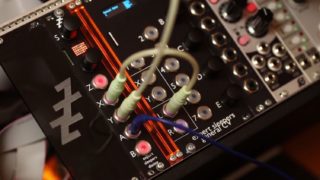 Expert Sleepers has released Version 4.10 of the disting mk4 firmware.
Expert Sleepers has released Version 4.10 of the disting mk4 firmware.
The update contains a number of new algorithms, including new SD card-based delays offering extremely long delay times.
Here’s what’s new:
- Added the Clockable SD Delay, Stereo Clockable SD Delay, and Stereo Clockable SD Delay (Z clock) algorithms.
- Added the Clockable Wavetable LFO algorithm.
- Added the Wavetable Waveshaper algorithm.
- Added the DJ Filter algorithm.
- Added the Dual Vowel Filter algorithm.
- Added the Mixer algorithm.
- Added individual output attenuverters and a Y Offset parameter to the Clockable LFO algorithm.
- Added a Y Offset parameter to the State Variable Filter, LP/HP Filter, LP/HP Filter, BP/HP Filter, and BP/Notch Filter algorithms.
- The Shift Register Random CVs algorithm now has an Offset parameter, and the Shift Register Random Quantized CVs algorithm now has a Transpose parameter. For both algorithms, the output attenuator is now an attenuverter.
- Increased the length of the filename displayed by the Audio Playback algorithms.
- Fixed a problem which would cause some unusually formatted WAV files not to work.
- Fixed a problem with receiving MIDI from certain devices (notably those by Elektron) which could result in stuck notes or notes being ignored.
- Fixed unnecessary output glitches which could occur when exiting the menu system or switching parameters.
- Fixed a problem which could cause the Z push to no longer switch parameters if the module were left untouched for about 7 hours.
Here are demos of the new features:
Stereo Clockable SD Delay (Z clock)
Clockable Wavetable LFO
Dual Vowel Filter
DJ Filter

If (like me) you ask “how long is a very-long delay?”
The manual says the stereo delay is 48 minutes.
The mono delay is about 95 minutes.
Yep. Quite a long delay!
And here I thought LFOs with 30 minute cycle times were weird.
What the hell do you do with a 95 minute delay?
…………….wait for it…………………………..
…………..wait for it…………….
If you asked Steve Reich he’ll probably find a use for it.
Bathroom and smoke break?
If a neighbor has a loud party just record and send the noise they make back at them 95 minutes later.
I built a synth for a college project a while ago, which had an analog/hard logic sequencer and microcontroller-based clock (was a bit of a box-ticking exercise on that front); I used a long int variable to set the clock rate, and didn’t constrain it, so I wound up with a clock that could be dialed down to less than one clock pulse per month…
Beep…….
(95 minutes later…..)
Beep……..
97 algorithms with this new firmware in only 4 HP. Awesome